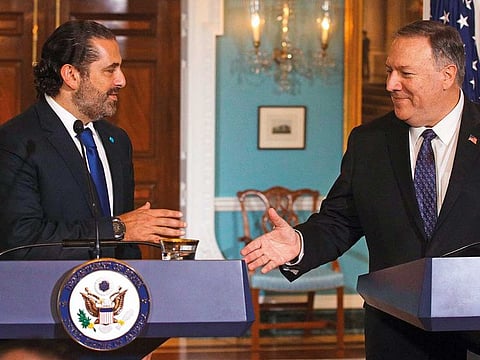Pompeo orders release of $115m in economic aid to Lebanon
US politicians disagree on whether aid will help or hurt Hezbollah

Also In This Package
Washington: Secretary of State Michael Pompeo personally intervened Thursday to order the release of about $115 million in economic aid to Lebanon that had been quietly held up for a month, the latest skirmish over delays that became an issue in the Ukraine impeachment inquiry, four people familiar with the matter said.
The delay in releasing the Economic Support Funds, which had not been previously reported, was imposed by Bonnie Glick, the deputy administrator at the U.S. Agency for International Development, after deliberations with Deputy National Security Adviser Victoria Coates and hard-liners in Congress, the people said.
Pompeo called Glick on Thursday and told her to release the money, they said.
Such aid deliberations have become more politically charged - and drawn far greater scrutiny - amid Democratic lawmakers’ impeachment inquiry into President Donald Trump.
Democrats contend that Trump held up $391 million in aid to Ukraine to pressure its new president to investigate Joe Biden and the Democrats.
The economic assistance to Lebanon was separate from a package of $105 million in military assistance to Lebanon that was frozen without explanation in recent weeks before being released.
Both cases highlighted a deep divide within the administration over Lebanon, with hard-liners arguing that U.S. money to the Middle East country is only helping designated terrorist groups - chiefly Hezbollah, the Iran-backed militia that wields enormous sway over the government.
Hezbollah’s Influence
Other U.S. officials, including Pompeo and senior officials at the Defense Department, argued that the money has the opposite effect by helping inoculate Lebanese institutions against Hezbollah’s influence.
Releasing the economic assistance had been a priority for David Hale, the undersecretary of state for political affairs. Hale also testified in the Ukraine impeachment inquiry.
According to a notification submitted to Congress on Thursday morning and obtained by Bloomberg News, the $114.5 million in aid supports “good governance, civil society, water supply and sanitation, basic education, higher education, and private sector productivity programming.”
Lebanon has been without a functioning government since Prime Minister Saad Hariri resigned in late October in the face of mass protests against a political establishment accused of corruption and economic management.
Meeting in Paris on Wednesday, diplomats from France, the U.S. and other nations said Lebanon shouldn’t expect a bailout for its struggling economy until it implements a raft of reforms.
Sign up for the Daily Briefing
Get the latest news and updates straight to your inbox




